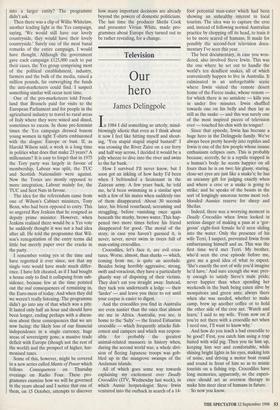Radio
Why did I
vote yes?
Michael Vestey
It is 23 years since we voted by a margin of two to one to remain in what was then the European Economic Community or Common Market as it was still quaintly known. So it was salutary to be reminded on Consequences on Radio Four last Thurs- day of the manipulation and mind-bending that took place before the 1975 referendum held by Harold Wilson's Labour govern- ment, a process likely to be repeated after the next general election when we will gra- ciously be asked whether or not we should abolish our currency.
When Edward Heath's government took us in, it didn't find it necessary to seek our views. Wilson did so only after a 'renegotia- tion' of the terms of entry and the referen- dum was entirely a device to end the divisions in the Labour party over Europe. The result, of course, settled the issue for Labour and got Wilson off the hook. The programme, written and presented by Jonathan Freedland, talked to some of the grandees who led the Yes campaign, and caught some of the now rather dated atmo- sphere of the run up to the vote.
There was the then Labour MP and min- ister Shirley Williams wittering on about the consequences of a No vote, how it 'lit- erally would break our hearts if we had no future role on the world stage. I don't believe we can turn our back on the rest of the world, on the open sea, and look to our own cabbage patch or build a siege econo- my in this one country.' The mixed metaphors aside, yes, she actually said it and meant it. That the opposite has taken place since, that now we are a mere region of Europe, a status to be finally sealed by the single currency, would not occur to her. Or, if it did, would probably appeal. What is it about this nation that so upsets intel- lectuals that they wish to see it subsumed into a larger entity? The programme didn't ask.
Then there was a clip of Willie Whitelaw, another leading light in the Yes campaign, saying, 'We would still have our lovely countryside, they would have their lovely countryside.' Surely one of the most banal remarks of the entire campaign, I would have thought. Although the government gave each campaign £125,000 each to put their cases, the Yes group comprising most of the political establishment, industry, farmers and the bulk of the media, raised a million pounds, far outweighing the funds the anti-marketeers could find. I suspect something similar will occur next time.
One of the pro-marketeers told Freed- land that Brussels paid for visits to the European Parliament and for people in the agricultural industry to travel to rural areas of Italy where they were wined and dined, sometimes to excess. In those pre-feminist times the Yes campaign dressed buxom young women in tight T-shirts emblazoned with the slogan: Europe or bust. If, as Harold Wilson said, a week is a long time in politics what does that make 23 years? A millennium? It is easy to forget that in 1975 the Tory party was largely in favour of membership, Labour was split, the TUC and Scottish Nationalists were against. Now the Tories are mostly opposed to more integration, Labour mainly for, the TUC and Scot Nats in favour.
The idea for the referendum came from one of Wilson's Cabinet ministers, Tony Benn, who had been opposed to entry. This so angered Roy Jenkins that he resigned as deputy prime minister. However, when Jenkins realised there would be a Yes vote he suddenly thought it was not a bad idea after all. He told the programme that Wil- son's renegotiation of the entry terms did little but merely paper over the cracks in the party.
I remember voting yes at the time and have regretted it ever since, not that my single vote would have made much differ- ence. I have felt cheated, as if I had bought a house only to find it collapsing from sub- sidence, because few at the time pointed out the real consequences of remaining in, the Euro-mess of today. And when they did we weren't really listening. The programme didn't go into any of that which was a pity. It lasted only half an hour and should have been longer, ending perhaps with a discus- sion about these consequences that we are now facing: the likely loss of our financial independence in a single currency, huge areas of sovereignty gone, a massive trade deficit with Europe (though not the rest of the world) and the prospect of higher, har- monised taxes.
Some of this, however, might be covered in a new series called Matrix of Power which follows Consequences on Thursday evenings on Radio Four. These pro- grammes examine how we will be governed in the years ahead and I notice that one of them, on 15 October, attempts to discover how many important decisions are already beyond the powers of domestic politicians. The last time the producer Sheila Cook and presenter Vivian White, made pro- grammes about Europe they turned out to be rather revealing, for a change.



































































 Previous page
Previous page